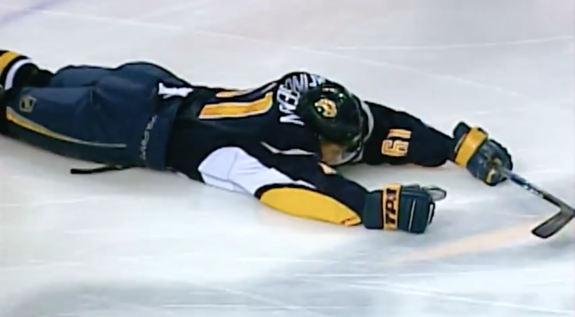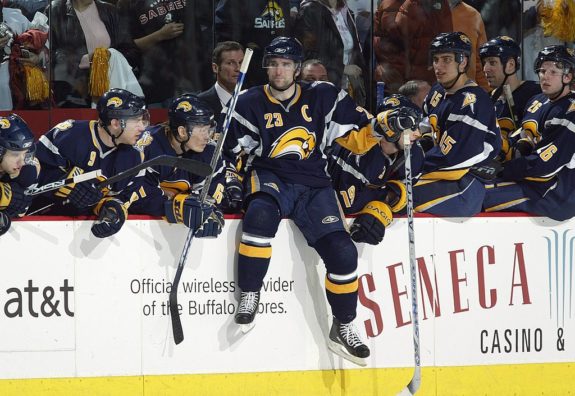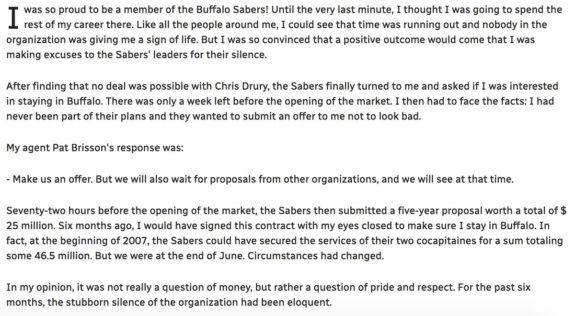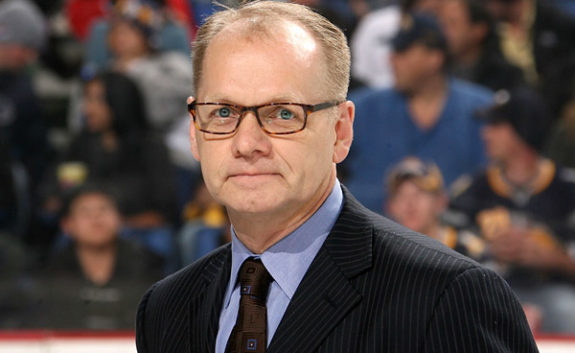In the first season following the 2004-05 lockout, the on-ice product in the NHL had shifted drastically. Gone were the days of the “clutch and grab” that allowed slow, lumbering defensemen to drape themselves on smallish, skill-players. The league experienced a renaissance of sorts, dubbed the “New NHL”.
Whether it was unprecedented organizational foresight or dumb luck, the Buffalo Sabres had assembled a near-perfect roster to fit the changing times. They were the gold standard of the new NHL, just 18 months removed from an 85 point finish in 2003-04.
The Sabres’ New Core
With a self-imposed internal salary cap, the Sabres rarely fielded a roster that featured marquee players. Though general manager Darcy Regier would be remembered more for his follies than his triumphs, he managed to broker separate trades to obtain two inexpensive, high-profile, offensive playmakers.

On trade deadline day in 2003, Regier made what would arguably be the most one-sided trade in franchise history. In exchange for Chris Gratton and a fourth-round draft pick, the Sabres acquired young speedster, Danny Briere and a third-round selection (which, interestingly enough, would become current Edmonton Oilers stalwart, Andrej Sekera) from the Phoenix Coyotes.
While Gratton was a relatively productive player, Regier realized that he would never be a consistent contributor. Enamored with Gratton’s 6-foot-4, 226-pound frame, the Coyotes failed to see the value in a much faster (and more productive) Briere.
After the free-agency period opened just four months later, Regier followed up with an encore when he acquired Chris Drury (and Steve Begin) from the Calgary Flames in exchange for Rhett Warrener and Steven Reinprecht (who he had acquired just hours prior in a trade with the Colorado Avalanche).
True to his word, Regier used that offseason to flush out a middling core. Fans suffered through one more season of mediocrity before the lockout deprived them of hockey for an entire calendar year.
Leading up to the 2005-06 campaign, it was unclear whether or not the Sabres would continue to improve with a revamped lineup. They were going to field the youngest roster in the NHL, and players like Derek Roy, Jason Pominville and Thomas Vanek were forced to play key roles in their rookie season.
With Tom Golisano anxious to experience his first taste of playoff hockey as the Sabres’ new owner, Ruff and Regier were held under the microscope. A failure to contend for the postseason may have encouraged Golisano to clean house and move on from the incumbent coach and general manager.
Realizing that his young squad would require the guidance of a strong leadership group, Ruff turned to Drury and Briere, naming them co-captains for the season.

The decision was met with some early criticism from fans and the media, though their concerns were quelled in short order. After starting the year with a 16-11 record, the Sabres won seven straight to start the month of December, propelling them toward the top of the Eastern Conference.
These guys were good. “Scary good.”
Two Heroic Playoff Runs
The Sabres would go on to make the playoffs that season, advancing all the way to the Eastern Conference Finals before injuries to four of their top six defencemen led to a heartbreaking Game 7 elimination by the Carolina Hurricanes.
Though the loss shook a hopeful and inspired fan base, the battered lineup of unlikely warriors was welcomed back to Buffalo as heroes. Supporters of the blue and gold waited with anxious anticipation for another run at the Stanley Cup. Optimism surrounding the team was at an all-time high.
Though he only played 48 games during the regular season, Briere finished with 58 points, good for fourth on the team. Drury’s 67 points in 81 games matched a career high.
As a restricted free agent that summer, Briere took the Sabres to arbitration, where he was awarded a one-year, $5 million deal, which the Sabres quickly accepted. With he and Drury set to hit the unrestricted market the following summer, fans knew that this would likely be the last year with both of their captains on the roster.
With emerging stars in Vanek, Pominville and Maxim Afinogenov, the NHL was put on notice that Buffalo was on the warpath, ready to avenge their unfair elimination the season prior.

They didn’t disappoint.
The high-octane Sabres led the league in goals that season and finished with 113 points, earning the franchise its first-ever Presidents’ Trophy. Buffalo entered the playoffs as a heavy favorite to win the Stanley Cup.
Briere proved that his performance the season before wasn’t an apparition, registering 95 points while remaining healthy throughout the year. Drury established himself as the greatest clutch goal scorer in team history, leading the Sabres to several comeback victories in both the regular season and playoffs.
As the season wore on it became more and more evident that management would have to choose between them, especially with Vanek (who made a colossal jump from 48 to 84 points between 2005-06 to 2006-07) set to become a restricted free agent.
Though the Sabres were better than the year before, they fell short of the Stanley Cup, losing yet again in the Eastern Conference Final, this time to their division rivals, the Ottawa Senators. The loss stung a bit more. Fans knew that another run without one of Briere or Drury would be much more difficult.
The consensus across Western New York was that Drury would be the one to stay. Local sports pundits and fans felt that Vanek would continue to progress and eventually match Briere’s production, making him more expendable, and citing Drury’s leadership and clutch situational ability as irreplaceable.
None of them expected what happened next.
July 1, 2007: The Darkest Day in Sabres History
Nothing could have prepared Sabres fans for that day. Not even in their wildest dreams could they have imagined that the front office was so inept.
Hearts sank as the clock ticked closer to the opening of free agency and it was very likely that the Sabres had failed to strike a deal with either Drury or Briere. By six o’clock that evening, both players had been scooped up by new teams, leaving Buffalo empty-handed.
To make matters worse, a few days later, the Edmonton Oilers extended a ridiculous seven-year, $50 million offer sheet to Vanek and Regier was forced to match the offer. If he hadn’t, the Sabres would have lost their top-three point producers in the same offseason.
Buckle up, it gets worse.
In an attempt to save face, the team spun the situation by villainizing Drury. Rumors spread that the team had a deal in place with Drury but he chose to leave for greener pastures. While there was some truth to this claim, it was later revealed, when put into context, how poorly Sabres management had handled the situation.
According to the Buffalo News, Drury and the Sabres had agreed on an extension prior to the 2006-07 season.

Great, right?
Although both parties agreed to a five-year extension for the co-captain, the Sabres neglected to send an executed contract to Drury’s agent. That’s right folks, after verbally agreeing to a deal that would lock down the most important player on the roster, the front office failed to get a signature.
What happened you ask? Nobody really knows for sure.
Perhaps the Sabres got cold feet and instead of informing the player, they simply ignored the situation hoping it would go away. Following this unfathomable saga, the Sabres reached back out to Drury to sign the deal after he registered 69 points (a career high) that season. At that point, the franchise center felt spurned by the organization and refused to negotiate a new contract.
In his new autobiography, released on Thursday (only available in French for now), Briere revealed just how negotiations went down with Regier and company after they realized that Drury wasn’t coming back. Stick-tap to @ryannagelhout.

Briere has confirmed that, as many fans suspected, the Sabres waited until the very last minute to offer their best offensive playmaker a contract. They’re lucky that Briere was open to an extension after the organization dragged him to arbitration a year prior.
In a three-year span, Regier managed to build the best team in the NHL and in one fell swoop, completely destroyed it. He had the opportunity to lock down the two best players on the team but instead assumed that losing Briere in the pursuit of Drury was inevitable, and alienated both men in the process.
Despite all of his great moves as the longest-tenured general manager in team history, Regier will be forever known solely for this monumental blunder, and deservedly so.
If the Sabres Handled Things Differently
For those who haven’t slammed their computer screens in frustration, let’s speculate on what would have happened if the franchise had done the logical thing and simultaneously pursued extensions for their co-captains.
If the Sabres’ brass had managed to fully execute the reported contract offers to Drury and Briere, they would have secured the services of both players for under $10 million AAV. With the league salary cap set at $50.3 million for the 2007-08 season, those deals would have been manageable. Although it is unclear what the Sabres’ aforementioned self-imposed cap was set at, Vanek’s contract would have been the only other outstanding negotiation that offseason.

While it’s easy to criticize the Sabres in hindsight, at the time, Vanek had the makings of a marquee player. Obviously, nobody could have anticipated the ridiculous offer sheet that the Oilers would send his way, but that’s what Regier got for waiting.
His tendency to hold off until the last minute to negotiate with players was maddening. If the front office had any foresight whatsoever, they could have easily retained Vanek for a much smaller price.
Let’s assume that Briere and Drury were locked down with shiny new five-year deals and Vanek was the lone open contract heading into free agency. It’s reasonable to assume that the Oilers would have still extended an offer sheet. Edmonton had very little to gain by sabotaging the Sabres’ future plans, so they clearly had their eye on Vanek from the start. In fact, they may have been even more likely to extend an offer with what would have been a very tight cap situation in Buffalo.

Regier would likely have accepted the four first-round picks in exchange for the 23-year-old, which in retrospect would have been an absolute steal. While productive throughout the remainder of his career, Vanek was never able to match his output from the 2006-07 season.
Who knows if the Sabres would have continued to contend in the east? It’s easy to play armchair general manager in retrospect. However, over a decade later, the Sabres still haven’t recovered from Reiger’s mistakes and the team hasn’t won a playoff series since.
Fans are still waiting for the “better days” they were promised.